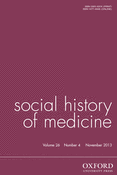-
Views
-
Cite
Cite
Debra Blumenthal, Michele L. Clouse, Medicine, Government and Public Health in Philip II's Spain: Shared Interests, Competing Authorities, Social History of Medicine, Volume 26, Issue 4, November 2013, Pages 790–792, https://doi.org/10.1093/shm/hkt048
Close - Share Icon Share
Extract
In this carefully researched and clearly written monograph, Michele L. Clouse joins a distinguished group of historians of science (Jorge Cañizares-Esguerra, William Eamon, David Goodman, and, more recently, Daniela Bleichmar) who have stressed how, in the early modern era, Iberian science played a pivotal (though generally under-recognised) role in the development of the western scientific tradition, decrying the unfounded and remarkably durable assumption that ‘the Spanish crown hindered, restricted and suppressed intellectual thought’ (p. xii.).
Clouse's focus, however, is not really on the development of medical thought or ideas but rather on the regulation of the medical profession during the reign of Philip II (1556–598), ‘arguably the most powerful of the Habsburg monarchs’ (p. 1). In five chapters (plus an introduction and epilogue), Clouse's study chronicles the extensive interventions of Philip II (also known as ‘The Paper King’) in the medical marketplace. While the first chapter treats Philip II's efforts towards expanding the authority of the protomédico (the royal official charged with supervising medical practitioners throughout the empire), the four subsequent chapters consider: his reform of medical education in the universities; Crown patronage of surgeons and empiric practitioners; Crown intervention in the licensing of non-university trained practitioners (devoting an entire fascinating chapter to the professionalisation of apothecaries), and, finally, its role in shaping public health policies towards the poor. Throughout, Clouse insists that it would be a mistake to read Philip II's actions here as simply one further example of his micromanaging tendencies. Rather, Clouse maintains they should be seen as a reflection of the time in which he lived, a time when ‘many institutions and individuals, from towns to universities, faculty to medical practitioners, had a vested interest in shaping the medical world’ (p. xii). In Clouse's estimate, Philip II's interest in medicine was rooted both in his own personal experiences as someone plagued by chronic health problems and in his keen awareness that the welfare of his kingdom depended on the welfare of his subjects.




